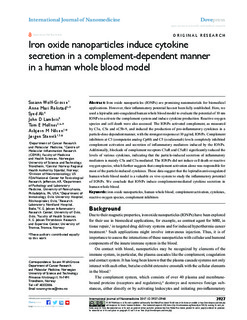| dc.contributor.author | Wolf-Grosse, Susann | |
| dc.contributor.author | Rokstad, Anne Mari | |
| dc.contributor.author | Ali, Syed | |
| dc.contributor.author | Lambris, JD | |
| dc.contributor.author | Mollnes, Tom Eirik | |
| dc.contributor.author | Nilsen, Asbjørn Magne | |
| dc.contributor.author | Stenvik, Jørgen | |
| dc.date.accessioned | 2017-06-22T08:12:45Z | |
| dc.date.available | 2017-06-22T08:12:45Z | |
| dc.date.created | 2017-06-16T09:03:46Z | |
| dc.date.issued | 2017 | |
| dc.identifier.citation | International Journal of Nanomedicine. 2017, 12 3927-3940. | nb_NO |
| dc.identifier.issn | 1176-9114 | |
| dc.identifier.uri | http://hdl.handle.net/11250/2446647 | |
| dc.description.abstract | Abstract: Iron oxide nanoparticles (IONPs) are promising nanomaterials for biomedical applications. However, their inflammatory potential has not been fully established. Here, we used a lepirudin anti-coagulated human whole blood model to evaluate the potential of 10 nm IONPs to activate the complement system and induce cytokine production. Reactive oxygen species and cell death were also assessed. The IONPs activated complement, as measured by C3a, C5a and sC5b-9, and induced the production of pro-inflammatory cytokines in a particle-dose dependent manner, with the strongest response at 10 µg/mL IONPs. Complement inhibitors at C3 (compstatin analog Cp40) and C5 (eculizumab) levels completely inhibited complement activation and secretion of inflammatory mediators induced by the IONPs. Additionally, blockade of complement receptors C3aR and C5aR1 significantly reduced the levels of various cytokines, indicating that the particle-induced secretion of inflammatory mediators is mainly C5a and C3a mediated. The IONPs did not induce cell death or reactive oxygen species, which further suggests that complement activation alone was responsible for most of the particle-induced cytokines. These data suggest that the lepirudin anti-coagulated human whole blood model is a valuable ex vivo system to study the inflammatory potential of IONPs. We conclude that IONPs induce complement-mediated cytokine secretion in human whole blood. | nb_NO |
| dc.language.iso | eng | nb_NO |
| dc.publisher | Dove Medical Press | nb_NO |
| dc.rights | Navngivelse-Ikkekommersiell 4.0 Internasjonal | * |
| dc.rights.uri | http://creativecommons.org/licenses/by-nc/4.0/deed.no | * |
| dc.title | Iron oxide nanoparticles induce cytokine secretion in a complement-dependent manner in a human whole blood model | nb_NO |
| dc.type | Journal article | nb_NO |
| dc.type | Peer reviewed | nb_NO |
| dc.description.version | publishedVersion | nb_NO |
| dc.source.pagenumber | 3927-3940 | nb_NO |
| dc.source.volume | 12 | nb_NO |
| dc.source.journal | International Journal of Nanomedicine | nb_NO |
| dc.identifier.doi | 10.2147/IJN.S136453 | |
| dc.identifier.cristin | 1476549 | |
| dc.description.localcode | © 2017 Wolf-Grosse et al. This work is published and licensed by Dove Medical Press Limited. The full terms of this license are available at https://www.dovepress.com/terms.phpand incorporate the Creative Commons Attribution – Non Commercial (unported, v3.0) License (http://creativecommons.org/licenses/by-nc/3.0/). By accessing the work you hereby accept the Terms. Non-commercial uses of the work are permitted without any further permission from Dove Medical Press Limited, provided the work is properly attributed. For permission for commercial use of this work, please see paragraphs 4.2 and 5 of our Terms | nb_NO |
| cristin.unitcode | 194,65,15,0 | |
| cristin.unitname | Institutt for kreftforskning og molekylær medisin | |
| cristin.ispublished | true | |
| cristin.fulltext | original | |
| cristin.qualitycode | 1 | |

